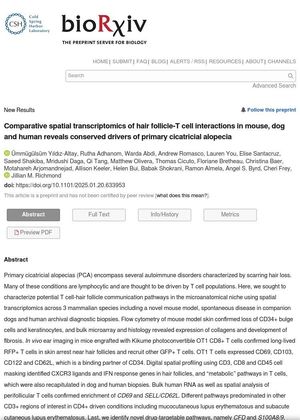Comparative Spatial Transcriptomics of Hair Follicle-T Cell Interactions in Mouse, Dog, and Human Reveals Conserved Drivers of Primary Cicatricial Alopecia
January 2025
in “
bioRxiv (Cold Spring Harbor Laboratory)
”

TLDR Potential therapeutic targets for scarring hair loss are identified.
The study investigates primary cicatricial alopecias (PCA), a group of autoimmune disorders causing scarring hair loss, by examining T cell-hair follicle interactions across mice, dogs, and humans. Using spatial transcriptomics, the research identifies conserved pathways involving T cells and hair follicles, such as CXCR3 ligands and IFN response genes, which are consistent across species. The study highlights the loss of CD34+ bulge cells and keratinocytes in a mouse model, with fibrosis development confirmed through histology. Novel drug-targetable pathways, CFD and S100A8/9, are proposed for further exploration in treating these conditions. The findings suggest potential therapeutic targets for PCA, with implications for both veterinary and human medicine.




